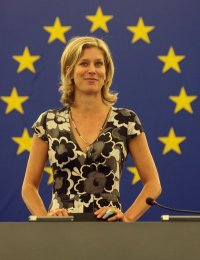The Fédération Internationale de Football Association (FIFA) overruled an earlier verdict banning Iran’s female footballers from observing Islamic code of dressing in the Olympic Games in Singapore, and allowed Iranian women footballers to wear Islamic dress during the competitions.
Earlier in March, FIFA had banned the Iranian women football squad wearing Hijab from participating in the inaugural Youth Olympic Games (YOG) which will be held from August 14 to 26 in Singapore.
Following the announcement, Head of Iran’s Football Federation Ali Kaffashian along with Member of the Federation’s International Relations Omid Jamali travelled to Switzerland to meet FIFA President Sepp Blater and FIFA Secretary-General Jerome Valcke on April 14.
The Iranian side could convince Blater and Valcke that the Iranian girls’ new wearing would not violate FIFA rules, noting that the entire world should respect Muslims’ rights and consider Islamic rules and values as a crucial factor when dealing with the Muslim countries’ women football teams.
Following the discussions in Switzerland, FIFA wrote a letter to Kaffashian, announcing its agreement with the Iranian girls’ Islamic code of dressing.
In its letter, FIFA said that if the hat covers the hair without violating the game’s rules and the girl footballers can use it, participation of the Iranian girls in the Olympic competitions in Singapore will be unimpeded.
FIFA also ordered the relevant bodies to take all the requirements to register the Iranian under-15 female footballers, stressing that there is no problem for the participation of the Iranian girls in the Singapore Olympic games.

 After Belgium’s parliament voted to ban Islamic full-face veils, the German vice-president of the European Parliament has called for a ban of the burka throughout Europe.
After Belgium’s parliament voted to ban Islamic full-face veils, the German vice-president of the European Parliament has called for a ban of the burka throughout Europe. Schools Secretary Ed Balls received a frosty reception from voters as he went head to head with the British National Party in a soapbox debate in West Yorkshire today.
Schools Secretary Ed Balls received a frosty reception from voters as he went head to head with the British National Party in a soapbox debate in West Yorkshire today. As the burqa debate raged in France this weekend, with the imposition of the first instant fine to a woman found wearing the burqa in a public place in Nantes, here in the UK former Justice Minister, Jack Straw, publicly apologised for having sparked controversy in October 2006 over making public
As the burqa debate raged in France this weekend, with the imposition of the first instant fine to a woman found wearing the burqa in a public place in Nantes, here in the UK former Justice Minister, Jack Straw, publicly apologised for having sparked controversy in October 2006 over making public